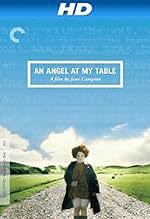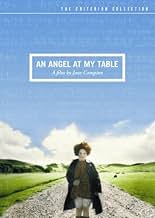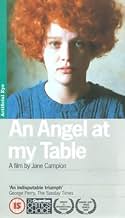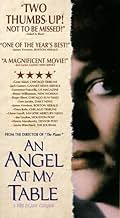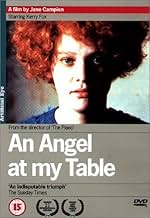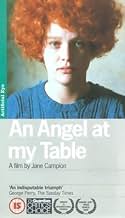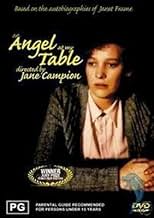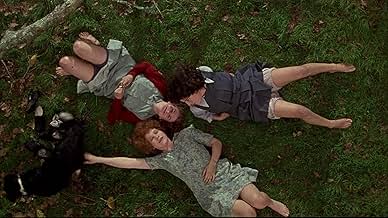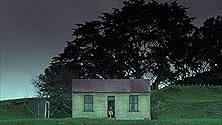IMDb-BEWERTUNG
7,4/10
9148
IHRE BEWERTUNG
Janet Frame war ein brillantes Kind, das als Teenager fälschlicherweise als schizophren diagnostiziert wurde. Erleben Sie Janets Entdeckung der Welt und ihr Leben in Europa, während ihre Büc... Alles lesenJanet Frame war ein brillantes Kind, das als Teenager fälschlicherweise als schizophren diagnostiziert wurde. Erleben Sie Janets Entdeckung der Welt und ihr Leben in Europa, während ihre Bücher unter großem Beifall veröffentlicht werden.Janet Frame war ein brillantes Kind, das als Teenager fälschlicherweise als schizophren diagnostiziert wurde. Erleben Sie Janets Entdeckung der Welt und ihr Leben in Europa, während ihre Bücher unter großem Beifall veröffentlicht werden.
- Auszeichnungen
- 19 Gewinne & 5 Nominierungen insgesamt
Kevin J. Wilson
- Father
- (as K.J. Wilson)
Empfohlene Bewertungen
An Angel at My Table tells the story of famed New Zealand author Janet Frame. We are drawn into the quiet world of the shy, red-haired girl who struggles with her life, but succeeds through her exceptional talent of writing. Since her autobiography was written in three separate volumes, we are treated to a film in three separate parts, beginning with her journey through childhood. The film does an excellent job at portraying the character of Frame, and her nervous attitude when brought into social situations. Every ounce of shyness is felt off-screen, which is a kudos to the direction of Campion, that plays an important part in making sure that this woman is brought to life, as realistic, and as close to the truth as possible.
Growing up in poverty, with two hard-working parents, and 4 siblings, life must've been hard. But when you're thrust into such a difficult situation, it somehow seems normal and it doesn't bother that it's a much harder life than other people currently living are. But Janet lived through her childhood, finding that she would love to spend her life as a poet, or just writing. A depression hit her hard during her teenage years when an unexpected tragedy occurred, and she had chosen to write, instead of being with that person beforehand. Not knowing she was a depressed young person, Frame was sent to a mental hospital, and forced to undergo several shock treatments, under the incorrect diagnosis of schizophrenia. However, Frame persevered through it, using writing as a way of expressing her own thoughts. While still in the mental hospital, she was able to publish a book. The years inside the hospital are the most unpleasant of film, and Campion perfectly captures the deranged conditions that Janet experienced. The most remarkable part about the direction is how it doesn't go over the top to deliver a nauseating film in those scenes. Rather, she plays to the quiet personality of Frame. The film is kept with the same pace, and focused in a way that never wants to show itself off, but keeps the main character always in the center, without losing that focus.
The blown-up biopic `Malcolm X' was released around a year later, and while I admire that film, it was also very hyped-up before it's release. I found a strange drawing power in the fact that Jane Campion's film wasn't about spectacle, but about someone's life that is done more sincerely, and realistically, paying close attention to details, both period and human. Something you wouldn't find in a Hollywood biopic, such as Milos Foreman's `Man on the Moon,' which I openly despise.
The writer and director surprised me a bit concerning a small detail in the film. In films concerning `writing', and an exceptional author (Wonder Boys, Finding Forrester), there is never any real proof of how good the writer supposedly is. We are never allowed to read the great book they wrote, nor are there much of any excerpts written to prove to us that the writer is indeed as great as it is suggested. In films, I realize that it really isn't possible to show such a thing, since film is a visual medium instead of a literary one. Campion and the screenwriter know this, and without subjecting us to Frame's writing, she adds in some narration, using actress Kerry Fox's voice. The narration is spread out in small bits throughout the film, never taking control of telling the story. Instead, it conveys the thoughts going on in Frame's mind, which are all little excerpts from the writing contained in her autobiographies. It begins with narration and ends with it. A surprising detail that is small, but adds much to the overall film, and gives the ending a sweet, and optimistic touch to an amazing film.
Frame was (is) talented at what she did most of the time, without knowing the talent was there. She only knew that she loved to do it, and wanted to continue doing it for the rest of her life. That is true talent. She had it, even at times when she thought there wasn't any hope; she had the ability to write. And because of that ability, that talent, she was able to gradually come to terms, and live comfortably with her life. ****1/2 of five or (9/10)
Growing up in poverty, with two hard-working parents, and 4 siblings, life must've been hard. But when you're thrust into such a difficult situation, it somehow seems normal and it doesn't bother that it's a much harder life than other people currently living are. But Janet lived through her childhood, finding that she would love to spend her life as a poet, or just writing. A depression hit her hard during her teenage years when an unexpected tragedy occurred, and she had chosen to write, instead of being with that person beforehand. Not knowing she was a depressed young person, Frame was sent to a mental hospital, and forced to undergo several shock treatments, under the incorrect diagnosis of schizophrenia. However, Frame persevered through it, using writing as a way of expressing her own thoughts. While still in the mental hospital, she was able to publish a book. The years inside the hospital are the most unpleasant of film, and Campion perfectly captures the deranged conditions that Janet experienced. The most remarkable part about the direction is how it doesn't go over the top to deliver a nauseating film in those scenes. Rather, she plays to the quiet personality of Frame. The film is kept with the same pace, and focused in a way that never wants to show itself off, but keeps the main character always in the center, without losing that focus.
The blown-up biopic `Malcolm X' was released around a year later, and while I admire that film, it was also very hyped-up before it's release. I found a strange drawing power in the fact that Jane Campion's film wasn't about spectacle, but about someone's life that is done more sincerely, and realistically, paying close attention to details, both period and human. Something you wouldn't find in a Hollywood biopic, such as Milos Foreman's `Man on the Moon,' which I openly despise.
The writer and director surprised me a bit concerning a small detail in the film. In films concerning `writing', and an exceptional author (Wonder Boys, Finding Forrester), there is never any real proof of how good the writer supposedly is. We are never allowed to read the great book they wrote, nor are there much of any excerpts written to prove to us that the writer is indeed as great as it is suggested. In films, I realize that it really isn't possible to show such a thing, since film is a visual medium instead of a literary one. Campion and the screenwriter know this, and without subjecting us to Frame's writing, she adds in some narration, using actress Kerry Fox's voice. The narration is spread out in small bits throughout the film, never taking control of telling the story. Instead, it conveys the thoughts going on in Frame's mind, which are all little excerpts from the writing contained in her autobiographies. It begins with narration and ends with it. A surprising detail that is small, but adds much to the overall film, and gives the ending a sweet, and optimistic touch to an amazing film.
Frame was (is) talented at what she did most of the time, without knowing the talent was there. She only knew that she loved to do it, and wanted to continue doing it for the rest of her life. That is true talent. She had it, even at times when she thought there wasn't any hope; she had the ability to write. And because of that ability, that talent, she was able to gradually come to terms, and live comfortably with her life. ****1/2 of five or (9/10)
I think this film is another fine example of Kiwi talent! Some incredibly original literature, film, television, and acting talent originates from the island nation of New Zealand. "An Angel At My Table" is one of the great examples. The first time I saw this film (or tele-film) I was left emotionally affected by Janet Frame's life. I could not believe how easy it was for someone to be treated the way she was just because she was shy, socially awkward and had curly, red hair. How times have changed! Nowadays if you are not a freak ... you are a freak! It is scary to think how easy it was, apparently at that time, for a person to be thrown into a madhouse. Not to mention the deplorable conditions of those types of institutions.
Initially, I felt sorry for Ms. Frame but then I realized she probably has had a fuller life than I have had (or probably ever will). She has accomplished so much and given pleasure to the many who have read her stories and poetry. Watching this film has prompted me to begin looking for her writings since I have been so intrigued by her story. I was glad to see that by the end of the movie she had begun to become comfortable with herself and open her shell. Biographical information on Ms. Frame seems sketchy. I have not found much information about her life after the period where the film ended.
Thank you Jane Campion for another wonderful character driven film (albeit a real-life character this time)! The only real criticism I have of the film is the portrayal of Frame's time in the institution. While the film did not make it pretty nor gloss over the situation in general, sources I have read indicate Janet was dangerously close to receiving an operation that seems similar to a lobotomy. The operation, if performed, would have left Janet an emotionless, child-like creature and was not adequately depicted. But for the grace of her publication, she was saved.
Initially, I felt sorry for Ms. Frame but then I realized she probably has had a fuller life than I have had (or probably ever will). She has accomplished so much and given pleasure to the many who have read her stories and poetry. Watching this film has prompted me to begin looking for her writings since I have been so intrigued by her story. I was glad to see that by the end of the movie she had begun to become comfortable with herself and open her shell. Biographical information on Ms. Frame seems sketchy. I have not found much information about her life after the period where the film ended.
Thank you Jane Campion for another wonderful character driven film (albeit a real-life character this time)! The only real criticism I have of the film is the portrayal of Frame's time in the institution. While the film did not make it pretty nor gloss over the situation in general, sources I have read indicate Janet was dangerously close to receiving an operation that seems similar to a lobotomy. The operation, if performed, would have left Janet an emotionless, child-like creature and was not adequately depicted. But for the grace of her publication, she was saved.
For some people, "An Angel At My Table' would be a VERY long sit-through. The story of one of New Zealand's most famous authors, who succeeds despite having gone through schizophrenia isn't exactly family entertainment. But although the movie runs far too long, at 2 and a half hours, I found myself engaged quite a bit as soon as the story got moving, and not a relentless character study. Janette Frame, a girl with a serious shock of red hair, grows up, realizing her passion for writing, and suffers tremendous setbacks, both emotionally and professionally. What a performance the three actresses give as Janette, we see Janette as a young girl, a teenager, and as a young adult. Although Kerry Fox is the most well known of all three, all three are tremendous here, each taking the nuances of Frame, and developing the character beautifully. As per the case of all Jane Campion's films, she knows how to frame the camera quite well, and again, although the movie IS long, it does have a lot of amazing little moments
It's a biography of New Zealand author Janet Frame played by three different actresses over her life. She was born in 1924. Her large family is relatively poor. She's a chubby sensitive kid with big wild red hair. As a young teacher (Kerry Fox), she has an emotional breakdown and spends time in a mental hospital. She is diagnosed a schizophrenic. With her mother's approval, she is admitted to a mental hospital for over 8 years where she is subjected to 200 shock treatments barely escaping brain surgery.
This is an interesting portrait of a life. It isn't that dramatic except for the hospital section. It's more a series of events where a nervous Janet is belittled and overlooked. It doesn't fit the traditional three act play structure. It's a simple straight time line of events. Jane Campion uses her style of directing. It's natural and confident. A more standard biopic would concentrate on the 8 year hospital stay making a drama out of it. Instead, this way is a more humanistic way of showing a life. Kerry Fox is terrific and the little girl has an unforgettable look.
This is an interesting portrait of a life. It isn't that dramatic except for the hospital section. It's more a series of events where a nervous Janet is belittled and overlooked. It doesn't fit the traditional three act play structure. It's a simple straight time line of events. Jane Campion uses her style of directing. It's natural and confident. A more standard biopic would concentrate on the 8 year hospital stay making a drama out of it. Instead, this way is a more humanistic way of showing a life. Kerry Fox is terrific and the little girl has an unforgettable look.
In the ambitious follow-up to her celebrated debut feature 'Sweetie' Jane Campion presents yet another social misfit at odds with an unsympathetic world, drawing her inspiration this time from the autobiography of Janet Frame, a New Zealand writer who suffered eight years of electro-shock therapy after being misdiagnosed for schizophrenia. The film is structured in the form of a triptych, with the best moments (perhaps not surprisingly) all clustered in the first episode, showing the young Frame's childhood in a poor but literate household, always at the mercy of adult authority: teachers, doctors, and so forth. These early scenes aren't exactly meant to set a cheerful mood, but they look positively giddy compared to the rest of the film, the length of which eventually overwhelms its subject: watching the drab and lonely life of a painfully shy, pathetically insecure, repressed and introverted writer unfold over 158 minutes can be an oppressive experience. Campion's unique visual style is never less than interesting, but her technique of using sudden blackouts to separate short, seemingly unrelated fragments of narrative memory only underscores the difficulty of capturing on film the creative process of a writer.
Wusstest du schon
- WissenswertesKerry Fox gained two stones (12.7kg) for her role as Janet Frame. She managed this by drinking liters of Coca-Cola, eating packets of chocolate biscuits and going on the pill.
- PatzerThe streets of Ibiza have some features that surely were not present on the 50s, i.e., a "no parking" signal on one of the streets. Cars were very rare on the island those days.
- SoundtracksSomebody Stole My Gal
Written by Leo Wood
Performed by Pat McMinn with Crombie Murdoch and the Nickelodeons
Used by permission of D.F. Peach
Top-Auswahl
Melde dich zum Bewerten an und greife auf die Watchlist für personalisierte Empfehlungen zu.
- How long is An Angel at My Table?Powered by Alexa
Details
- Erscheinungsdatum
- Herkunftsländer
- Sprachen
- Auch bekannt als
- Ein Engel an meiner Tafel - Eine Trilogie
- Drehorte
- Produktionsfirmen
- Weitere beteiligte Unternehmen bei IMDbPro anzeigen
Box Office
- Bruttoertrag in den USA und Kanada
- 1.054.638 $
- Eröffnungswochenende in den USA und in Kanada
- 12.905 $
- 27. Mai 1991
- Weltweiter Bruttoertrag
- 1.055.995 $
- Laufzeit2 Stunden 38 Minuten
- Farbe
- Seitenverhältnis
- 1.66 : 1
Zu dieser Seite beitragen
Bearbeitung vorschlagen oder fehlenden Inhalt hinzufügen

Oberste Lücke
By what name was Ein Engel an meiner Tafel (1990) officially released in India in Hindi?
Antwort

